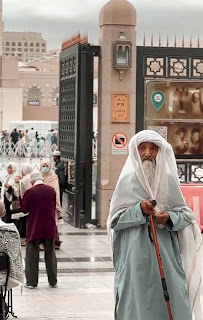An Old Man In Madina Video Goes Viral On Arab Social Media
(This Article Not About This Old Man)
Abu Bakr Siddiq (RA) was the first Caliph of the Muslim Ummah, succeeding the Prophet Muhammad (PBUH) after his death. Abu Bakr's life is an embodiment of piety, devotion, and selflessness. He was a prominent figure in the early years of Islam, and his contributions to the religion and its followers remain unmatched to this day.
Early Life:
Abu Bakr was born in Mecca in 573 AD, two years after the birth of the Prophet Muhammad (PBUH). His father, Abu Quhafah, was a merchant, and his mother, Umm Khair, belonged to the Banu Taim tribe. Abu Bakr belonged to a wealthy and respected family and was known for his honesty and integrity from an early age.
Abu Bakr embraced Islam in the early days of the religion. He was one of the first converts to the faith, and his conversion was a significant milestone in the spread of Islam. His conversion led to the conversion of many of his family members and friends, including Uthman ibn Affan and Talha ibn Ubaydullah, who later became prominent figures in Islamic history.
Role in Islam:
Abu Bakr played a pivotal role in the early years of Islam. He was a close companion of the Prophet Muhammad (PBUH) and was with him during many important events, including the migration to Medina. Abu Bakr was known for his generosity and selflessness and was always willing to help those in need.
After the Prophet Muhammad (PBUH) passed away, Abu Bakr was chosen as the first Caliph of the Muslim Ummah. During his reign, Abu Bakr faced many challenges, including the Ridda Wars and the invasion of the Byzantine Empire. However, he managed to lead the Muslim Ummah to victory in these conflicts, and his leadership helped to establish Islam as a dominant force in the Arabian Peninsula.
Abu Bakr was also responsible for compiling the Quran into a single book. He realized the importance of preserving the words of the Prophet Muhammad (PBUH) and ordered that all the verses of the Quran be collected and compiled into a single book. This effort helped to standardize the text of the Quran and ensured that it remained unchanged for generations to come.
Legacy:
Abu Bakr's legacy continues to inspire Muslims to this day. His life serves as a model for Muslims around the world, and his devotion to Islam and its followers remains unmatched. His leadership during the early years of Islam helped to establish the religion as a dominant force in the Arabian Peninsula, and his contributions to the compilation of the Quran ensured that the holy text remained unchanged for generations to come.
In conclusion, Abu Bakr Siddiq's life was one of piety, devotion, and selflessness. He played a pivotal role in the early years of Islam and his legacy continues to inspire Muslims to this day. As the first Caliph of the Muslim Ummah, Abu Bakr's leadership helped to establish Islam as a dominant force in the Arabian Peninsula, and his contributions to the compilation of the Quran ensured that the holy text remained unchanged for generations to come.


.png)





0 Comments